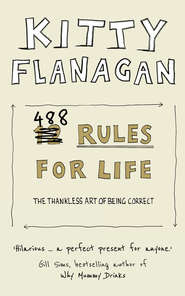
Полная версия:
488 Rules for Life: The Thankless Art of Being Correct

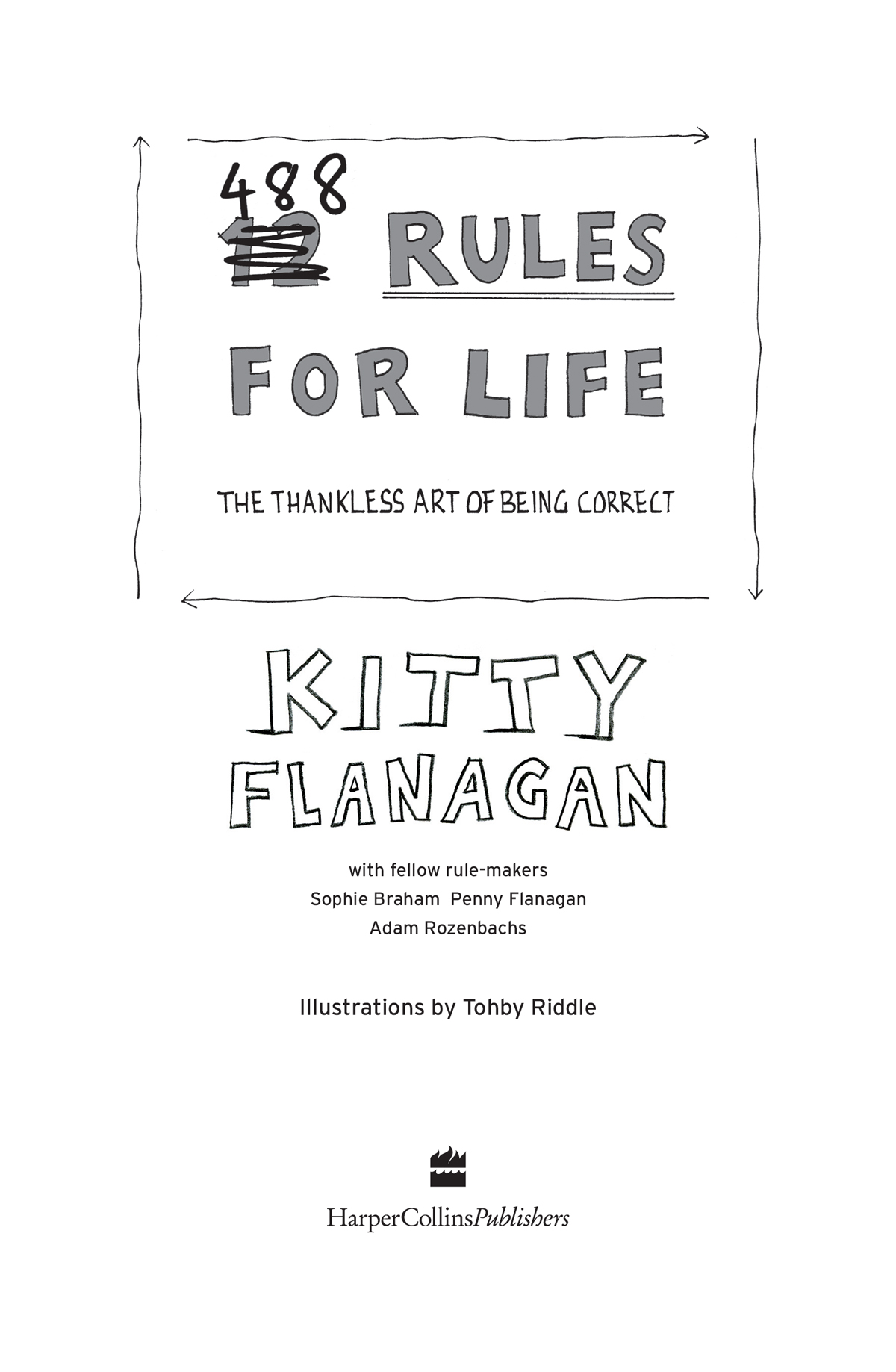
Copyright
Neither the author nor the publisher has any connection with either Jordan Peterson, the author of 12 Rules for Life, or the publisher of that book, and readers must not interpret anything in this book as giving rise to any such connection.
HarperCollinsPublishers
1 London Bridge Street
London SE1 9GF
www.harpercollins.co.uk
First published in Australia by Allen & Unwin 2019
This edition HarperCollinsPublishers 2019
FIRST EDITION
© Kitty Flanagan 2019
Cover design by Tohby Riddle © HarperCollinsPublishers 2019
Cover illustration © Tohby Riddle
Internal illustrations by Tohby Riddle
A catalogue record of this book is available from the British Library
Kitty Flanagan asserts the moral right to be identified as the author of this work
All rights reserved under International and Pan-American Copyright Conventions. By payment of the required fees, you have been granted the nonexclusive, non-transferable right to access and read the text of this e-book on screen. No part of this text may be reproduced, transmitted, downloaded, decompiled, reverse engineered, or stored in or introduced into any information storage retrieval system, in any form or by any means, whether electronic or mechanical, now known or hereinafter invented, without the express written permission of HarperCollins e-books.
Find out about HarperCollins and the environment at www.harpercollins.co.uk/green
Source ISBN: 9780008391836
Ebook Edition © November 2019 ISBN: 9780008391843
Version 2019-11-12
Dedication
For Marmee
Contents
Cover
Title Page
Copyright
Dedication
A word from the author
How to use this book
THE FUNDAMENTAL RULE
AROUND THE HOME
HEALTH & LIFESTYLE
AT THE OFFICE
LANGUAGE
PLANES, TRAINS & AUTOMOBILES
FOOD
RELATIONSHIPS & DATING
PARENTING
FASHION
AT THE MOVIES
AT THE SHOPS
TECHNOLOGY
SPORT
PARTIES & CELEBRATIONS
HOLIDAYS & TRAVEL
ART & ENTERTAINMENT
THE FINAL RULE
Acknowledgements
About the Author
Other Books By
About the Publisher
A word from the author
This book started out as a five-minute segment on ABC TV’s The Weekly program, it was inspired by the bestselling book 12 Rules for Life and it was a joke. I took issue with the fact that author, Jordan Peterson, only had twelve rules. Twelve? For life? That’s madness, I have more than twelve rules just for the bathroom.
After the segment aired, I kept being stopped by people wanting to know where they could buy this book (that didn’t actually exist) called 488 Rules for Life. It was suddenly apparent that I wasn’t the only crackpot out there who loves rules. So I decided to do the book for real. But it’s still a joke. Even I admit that 488 is a lot of rules and obviously no one will like all of the rules, but I’m pretty sure everyone will like some of the rules. And when you do hit a particular rule that resonates, it will make you feel really good—you’ll enjoy the fact that someone else gets as annoyed or outraged or exhausted by the same things you do.
If, by some chance, you manage to read the entire book and don’t find a single rule you agree with and instead keep thinking, I don’t get why she’s so irritated by people? Why can’t she just live and let live? that’s okay, that’s your prerogative … as long as you understand you are probably really annoying a lot of people around you with your unbearable positivity and your ‘I love everything’ attitude.
I think, deep down, people are crying out for rules. Once it was commonplace to look to published guides for advice on behaviour, protocol and etiquette. Guides produced by recognised authorities, such as Debrett’s in the United Kingdom and Emily Post in the United States. Even in Australia we had our very own Miss Manners, the formidable June Dally-Watkins—I met her once, she didn’t say hello, she just looked me up and down and told me in no uncertain terms I should never wear a white bra under a white shirt. ‘Always nude, dear, always nude.’
But these days there is no such guide in circulation, and I believe the rise in rude behaviour and the lack of basic courtesy we are witnessing in the modern world is quite possibly due to ignorance. If you don’t know the rules, how are you supposed to abide by them?
Which is why I say, thank god for me. Now, with this comprehensive reference book at your fingertips, there can be no excuse for bad behaviour. Whenever you’re unsure about the right way to behave, whenever you want to know what not to do in any given situation, simply turn to 488 Rules for Life. The answer is bound to be in here somewhere.
How to use this book
This book is divided into sections and within each section you will find a range of rules. Some are fairly basic, things that everyone should already know; others are more specific and are for the people I call genuine rule enthusiasts. And occasionally you will come across rules so particular and persnickety that only absolute zealots like myself will be able to get on board. I have separated these into special sealed sections so that the more tolerant reader can avoid them easily.
Whatever level of rule disciple you are, know that reading this book and observing these rules will definitely make the world a nicer place. I also guarantee you will be better looking and better informed; in fact, you’ll be a better human overall. So think of it as a self-help book, only you don’t have to give up sugar, buy expensive exercise equipment or keep a diary of your dreams. All you have to do is speak up when you see someone breaking the rules. A gentle but friendly reminder is all it takes: ‘Hey buddy! Rule number 266—no sunglasses on the back of your neck, cheers mate, just letting you know.’ There’s no need to be rude or confrontational about it, keep it light—remember, like me, you’re here to help.
THE FUNDAMENTAL RULE
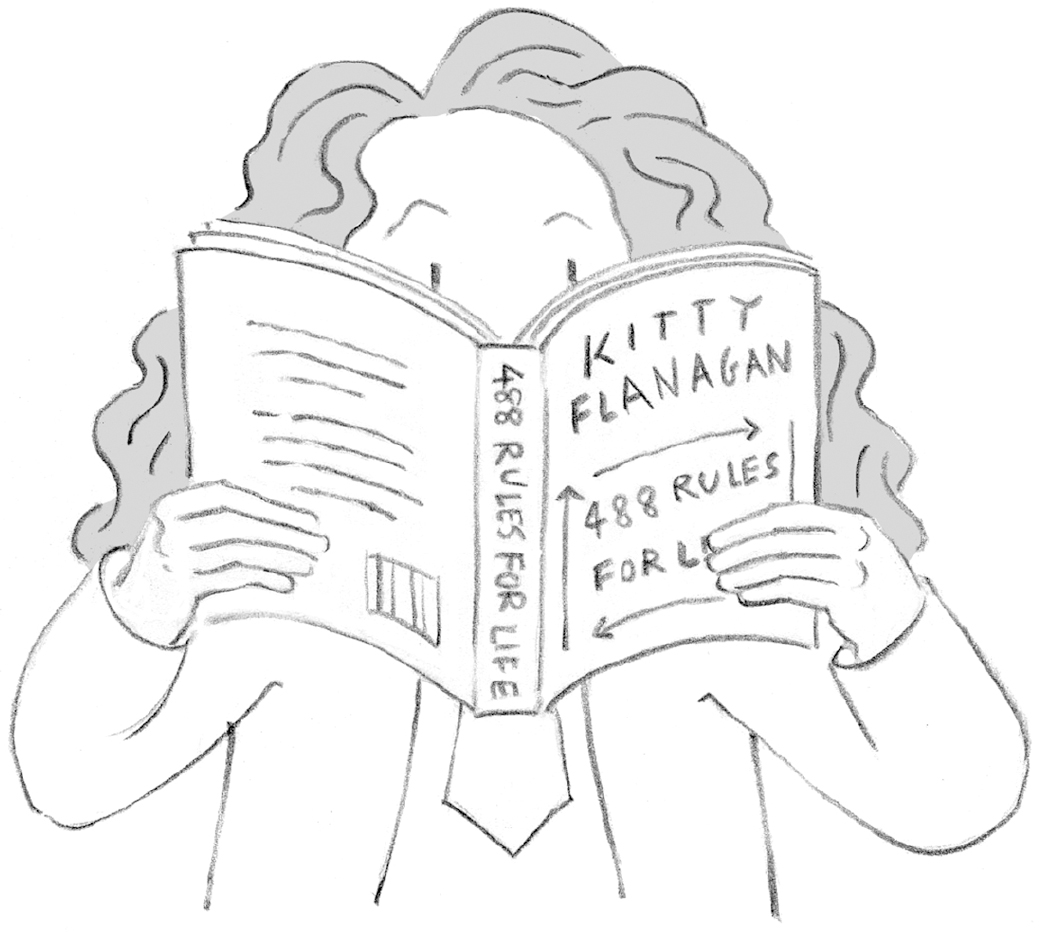
1
If you don’t agree with a rule, forget about it, move on to the next one
Whatever you do, don’t get angry and start bleating on social media about how it would be impossible to live your life by these 488 rules. That’s not what this book is about.
AROUND THE HOME
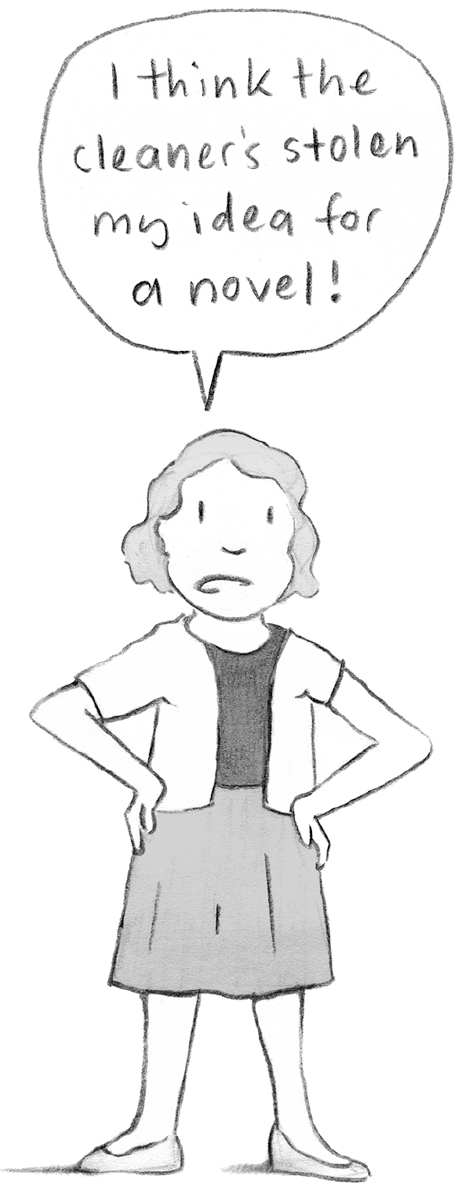
GENERAL HOUSE RULES
2
Football jerseys are not art
Don’t frame them. And definitely don’t hang them on the wall.
3
Don’t waste your money on surround sound
Nobody cares, guys. And I say guys because it is usually guys who insist on surround sound. When I’m watching TV, I find it weird if the sound isn’t coming from the television. After all, the person walking on the television is on the television, in front of me, so it’s really creepy to hear footsteps behind me or, indeed, all around me.
Same goes for those elaborate sound systems that people (again, usually men) install. The ones where they wire up the entire house with speakers in every room so they can pipe their chunes throughout. It’s not a department store, it’s just your house, you don’t need the music to follow you around wherever you go. Spend your money on nice ham instead.
4
You don’t need a media room or home cinema
Just watch television in the lounge room like a normal person. Or go to the cinema.
5
Supersizing is for beverages not family portraits
There are many businesses that will blow up your family photo onto an enormous canvas, but that doesn’t mean you should get one. A few regular-sized photos will do just fine; you don’t want to turn your living room into some kind of in-memoriam shrine.
6
Don’t complain about your cleaner
Having a cleaner is one of life’s greatest luxuries and if you can afford one you should be extremely grateful. And no matter how lax you might think your cleaner is, remember, it’s still better than mopping your own kitchen floor or scrubbing your own bathroom and pulling your own disgusting hair-monster out of the plughole.
7
Wait a week before accusing your cleaner of stealing
People always accuse the cleaner. Never to their face but behind their back in hushed tones to their friends: ‘I think the cleaner might have taken my necklace/favourite plate/earring/five bucks/tape measure/spatula, etc.’
Your cleaner is not stupid, cleaners know they will always be number one on the suspect list, which is why I guarantee the cleaner did not take your stuff.
Here’s the more likely scenario: you’ve put your necklace/favourite plate/earring/five bucks/tape measure/spatula somewhere you don’t usually put it and then done what all middle-aged people do—completely forgotten where you put it.
Give it a week; whatever the cleaner has ‘stolen’ will turn up.
8
Flags are not curtains
A flag in the window is a tell-tale sign that backpackers have moved in. And if the NSW tourism department is at all interested in my amateur research, I would say that based on the number of flag curtains in my area, the majority of visitors to Bondi Junction are coming from Ireland and Brazil. Welcome to you all … now please go buy some curtains.
9
Glamour shots belong in a drawer
First, think very carefully about whether you really need a soft-focus, glassy-eyed shot of yourself dressed in high heels and a feather boa, kneeling on a whorish-looking bed surrounded by red satin cushions. And then think even more carefully about whether you need to put that photo on display anywhere.
THE BATHROOM
10
Your bathroom must have a door
This sounds absurdly obvious but there is a disturbing trend among fancy-pants architects at the moment to create en suite bathrooms with glass doors, or worse, no doors. I understand the desire to merge your indoor and outdoor spaces or to combine your living and dining room, but this open-plan bedroom–bathroom thing is nothing more than a seamless merger of pretension and gross impracticality (emphasis on the gross).
11
One basin is ample
No matter how much you and your partner love doing stuff together, there is absolutely no need to brush your teeth standing side by side, each with your own individual basin. Personally, I prefer to be alone in the bathroom no matter what I’m doing. However, if you happen to be one of those weird couples who like being in the bathroom together, abluting at the same time, then surely you are comfortable enough to spit into the same sink. Which means ‘twin vanities’ are completely unnecessary. One bathroom, one basin.
12
Don’t marinate in your own filth
The bathroom is not a library, there are far more pleasant, not to mention less smelly, places to read your book. Don’t linger in there, get in get out.
13
Replace the toilet roll
Just do it. You’re a grown-up. It takes ten seconds.
14
Do not leave one square of toilet paper on the roll
Don’t kid yourself, this is worse than not replacing the roll because of the effort required to leave that one square behind. Everyone knows it wasn’t an accident, it was a carefully orchestrated event carried out in order to avoid replacing the roll. You pulled gently on the paper, taking great care not to unravel all of it and leave an empty roll. You may even have reverse-rolled it to make sure you left that one square on there: one square that you know perfectly well is of no use to anyone.
And don’t be the dick that just sits the new roll on top of the empty roll, that doesn’t count either.
15
Shut the bathroom door
I’ll brook no argument or discussion about this one. If you are on the toilet, shut the bathroom door; it’s a basic courtesy to your fellow householders. No one should have to see anyone else mid-evacuation with their pants around their ankles. Parents with small children, you are the exception. I realise that toddlers like to be able to access you at all times and will often hammer relentlessly on a closed bathroom door, concerned and sometimes even alarmed about your sudden disappearance from view. (My dog is a bit the same.)
16
No talking on the toilet
The only words you should ever have to utter while on the toilet are ‘I’m in here’ or ‘just a minute’ in response to an enquiring knock on the door. Nothing is so important that it can’t wait until you exit the bathroom. This rule is of particular concern in public bathrooms. A lot of women love a gabfest in the can, somehow forgetting that there are germs flying around all over the place, and by flapping your gums and having a good old chitty chat, you are inviting those germs right into your mouth. Bottom line, if your bum is open, your mouth should be closed.
17
Don’t take food or beverages into the toilet
Who’d have thought that ever needed to be said? But apparently it does. You know who you are (American guy called Tom who lives in Manchester) and whom I witnessed take a newspaper and ‘hot cup of joe’ into the bathroom.
18
The bathroom bin is for bathroom rubbish only
Sometimes you find that the bathroom bin is the closest bin. Perhaps you arrive home, you’ve just finished eating a banana or a packet of Twisties and you spy the bathroom bin as you walk down the hall. You must forgo the urge to toss your empty wrappers in there. Because what happens is, the next time someone is using the toilet, they’ll look down into the bin, see the banana skin and think, Oh dear god, was someone eating a banana on the can? How disgusting!
19
Flush. Pause. Check—FPC
Always wait after flushing so you can do a final check to make sure you are leaving nothing behind. Nothing. Not a mark, not a smear—there should be zero evidence of what’s gone on in that bathroom. Don’t leave a crime scene.
20
No phone calls on the toilet
The only thing worse than having a phone call with someone who is on the toilet is the realisation that they are indeed on the toilet. It’s usually something that dawns on you slowly. Probably because—for most normal people—the idea of making calls from the dunny is beyond comprehension, so it always takes a while to put all the pieces together. First you notice the strange echo-chamber effect, then come the oddly timed pauses and strangled grunts in their speech. ‘So I wondered if you … hnnnn … could let Margaret … hnnnnnnn … know that I might be late … hnn … today.’ And finally confirmation comes when you actually hear the waterfall cascading into the bowl or, worse, the splashdown. Unbelievable as it may seem, a lot of people take calls while on the toilet; I know because I hear them do it in public toilets all the time. A phone rings and then the person actually answers it? ‘Yeah … hnnnyhello?’ What is wrong with these people? The toilet cubicle is not a phone booth.
THE KITCHEN
21
The sink is not a dishwasher
These days most people have a dishwasher or, as I like to call it, a magic, electric, washy-washy box. And it really is magical, you can put anything in there and it comes out clean, requiring minimal effort on your part. Yet there are still people who think that dumping dishes in the sink, near the dishwasher, is good enough. It isn’t. Either go the extra half a yard (literally—the dishwasher is never far from the sink) and pop that sucker in the dishwasher or wash it up. They’re your two options. Do not, however, just plonk it in the sink and think, Well done me!
22
Everything can go in the dishwasher
Everything. No matter how big. Even if it takes ten minutes to rearrange everything in order to cram that saucepan or wok or blender jug in there, it’s better than having to spend two minutes washing something up.
23
Flog the dishwasher until it does the job properly
Sometimes the dishwasher does a half-arsed job and you find something that still has a bit of food stuck to it. When that happens, it’s up to the dishwasher to make things right. Don’t be a martyr and clean the dish or frying pan or wooden spoon yourself—that’s rewarding the dishwasher for shoddy workmanship. Instead, you put whatever it is right back in the dishwasher and leave it there until it comes out clean. Whether it takes another two or another twenty wash cycles, it doesn’t matter: the dishwasher has got to learn.
24
One person cooks, the other cleans up
In a couple or a family, the person who cooks the meal should never have to clean up as well. If you live alone, obviously this is not feasible, therefore I suggest you try to cook as neatly as you can. However, I must stress that this ‘cook neatly’ thing is a guideline, or recommendation, not a rule. As someone who lives alone and cooks like the Swedish chef from The Muppets, I cannot in all good conscience instruct anyone to ‘clean as you go’.
25
Clean up the kitchen before you go to bed
Again, not really a rule, more of a note to self.
HEALTH & LIFESTYLE
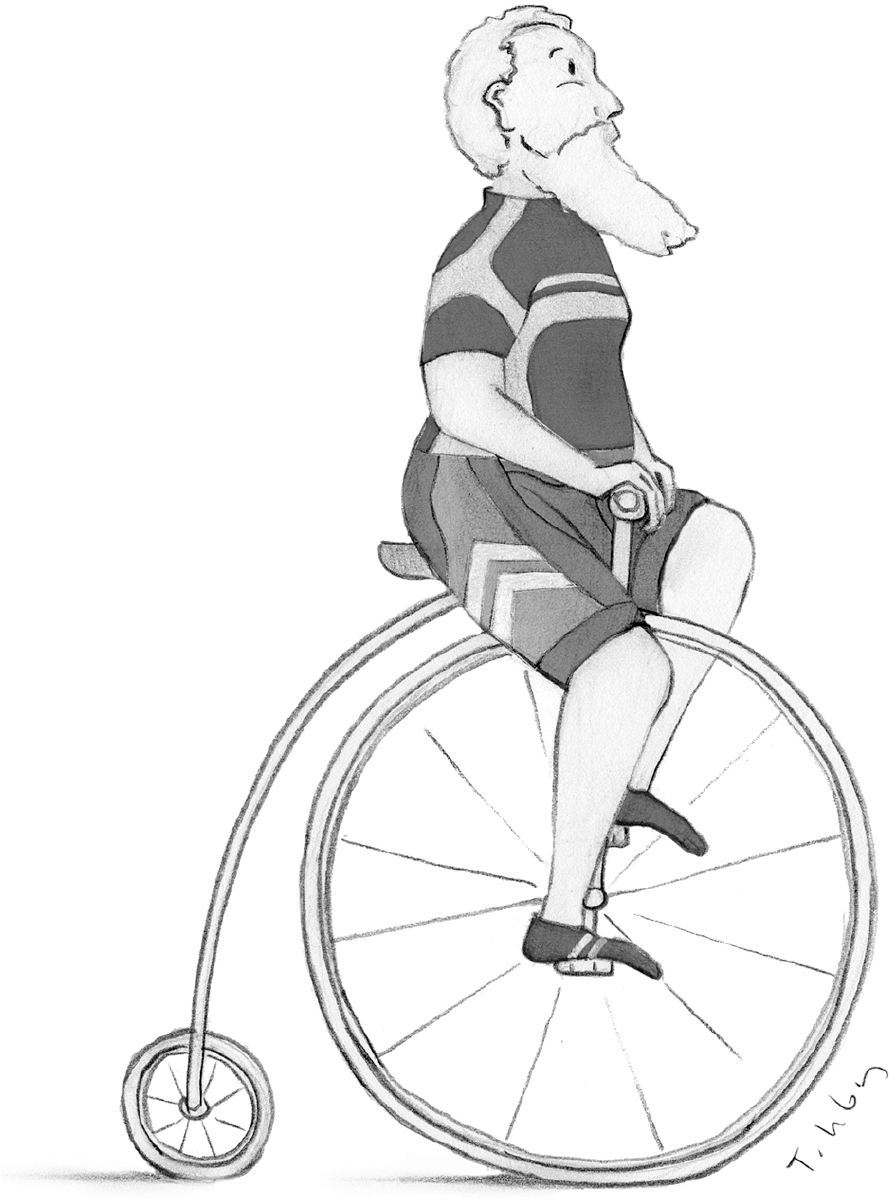
A word about wellness
Wellness advocates and experts all claim they can improve your quality of life, whether it’s by not eating sugar or by drawing toxins out of your body with hot cups and candles or by rubbing your face with dung because that’s what some tribe did 5000 years ago in a tiny part of outer Mongolia. But sometimes I think we can get distracted by all the hype and forget to look at the bigger picture.
I was backstage at a corporate event once and witnessed a well-known anti-sugar crusader nibbling the dark chocolate coating off a single almond. She was scraping it off in tiny bits with her front teeth. It took her about twenty minutes. She noticed me staring (it was hard to look away, she was gnawing at that thing like a rat on a cable) and confessed that she allowed herself a minuscule amount of dark chocolate every day as her little reward. I told her quite smugly that I didn’t allow myself any dark chocolate whatsoever. I didn’t say that it was because dark chocolate is a punishment disguised as confectionery, rather I just enjoyed pretending I took my health more seriously than she did.
I know she looks better than me and I know she’ll live longer than me, but my point about looking at the bigger picture is that I’m not sure I want to live longer if the only ‘treat’ I’m allowed is one dark chocolate nut per day. Especially if I have to eat it hunched over in a corner like an obsessive-compulsive squirrel.
And for the record, I don’t want to drink bone broth for breakfast or rub my face with dung either. I guess I just don’t care enough about my own wellness — which is not a word, by the way — and you can read more about that in Language Rules.
INSPIRATION AND ADVICE
26
Cushions are not spiritual advisors
The current trend for putting trite advice on soft furnishings has to stop. No one has ever read Live, Love, Laugh on a pillow or Dream, Relax, Feel on a wall hanging and thought, Oh what an excellent idea, I’ve not lived, loved or laughed in ages. Well, that all changes right now, thank you, cushion!
In fact, more often than not, I find these clichéd bon mots have the opposite effect and actually inspire rage and the desire to punch something, usually a cushion with the hateful Keep Calm and Carry On printed on it.
27
Never tell someone to ‘just imagine the audience naked’
This is one of the dumbest things you can ever say to a person who is about to do a bit of public speaking. There would be nothing more distracting than looking around a room and imagining what everyone looks like in the nude. How are you supposed to remember your speech when you’re envisaging a room full of lumpy naked people?



